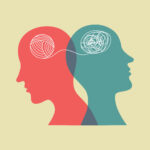
Have you ever done something that didn’t align with your values, and then felt uneasy or unsettled afterward? That uncomfortable feeling is known as cognitive dissonance, a common psychological experience that can have a significant impact on your mental health and decision-making.
At High Focus Centers, we help individuals explore the underlying thoughts and beliefs that influence their behaviors, including the internal conflict caused by cognitive dissonance. Gaining insight into this mental tug-of-war is an important step toward emotional wellness and personal growth.
What Is Cognitive Dissonance?
Cognitive dissonance is the psychological stress or discomfort we feel when we hold two or more conflicting beliefs, values or attitudes—or when our actions don’t align with our core beliefs. This internal conflict can create tension, leading to a strong desire to resolve the inconsistency, either by changing our thoughts or modifying our behavior.
For example, someone who values health but continues to smoke may experience cognitive dissonance. To reduce the discomfort, they might quit smoking, justify it (“I only smoke occasionally”) or downplay the health risks.
Common Examples of Cognitive Dissonance
Cognitive dissonance can show up in everyday life, often without us realizing. Some examples include:
- Staying in an unhealthy relationship while believing you deserve to be treated with respect
- Overspending while trying to stick to a financial goal or budget
- Avoiding exercise even though you believe physical activity is important
- Telling a lie despite valuing honesty
These conflicting behaviors and beliefs can lead to anxiety, guilt, shame or low self-esteem—especially when the dissonance becomes a recurring pattern.
How Cognitive Dissonance Affects Mental Health
Unresolved cognitive dissonance can negatively impact emotional well-being. Over time, people may experience:
- Chronic stress or anxiety
- Difficulty making decisions
- Rationalizing unhealthy behaviors
- Internalized guilt or shame
- Burnout from living out of alignment with personal values
If left unaddressed, these mental stressors can contribute to more serious issues such as depression, anxiety disorders and substance use.
How Therapy Helps Resolve Cognitive Dissonance
Therapy offers a safe, nonjudgmental space to explore the conflicting beliefs and behaviors that are causing distress. At High Focus Centers, our therapists use evidence-based approaches such as:
- Cognitive behavioral therapy (CBT) to help identify and challenge distorted thinking patterns
- Motivational interviewing to strengthen commitment to change
- Mindfulness techniques to increase self-awareness and acceptance
- Values-based counseling to help individuals realign their actions with their core beliefs
By working through these internal conflicts, individuals can reduce emotional discomfort, make healthier choices and live a more authentic life.
Find Clarity and Healing at High Focus Centers
Cognitive dissonance is a normal part of being human—but when it interferes with your well-being, it’s time to seek support. If you’re feeling stuck between what you believe and how you act, High Focus Centers is here to help. Our personalized treatment plans empower individuals to restore balance between thought and behavior and find lasting peace of mind.
 School Clearance Programs: Supporting Student Well-Being
School Clearance Programs: Supporting Student Well-Being 
